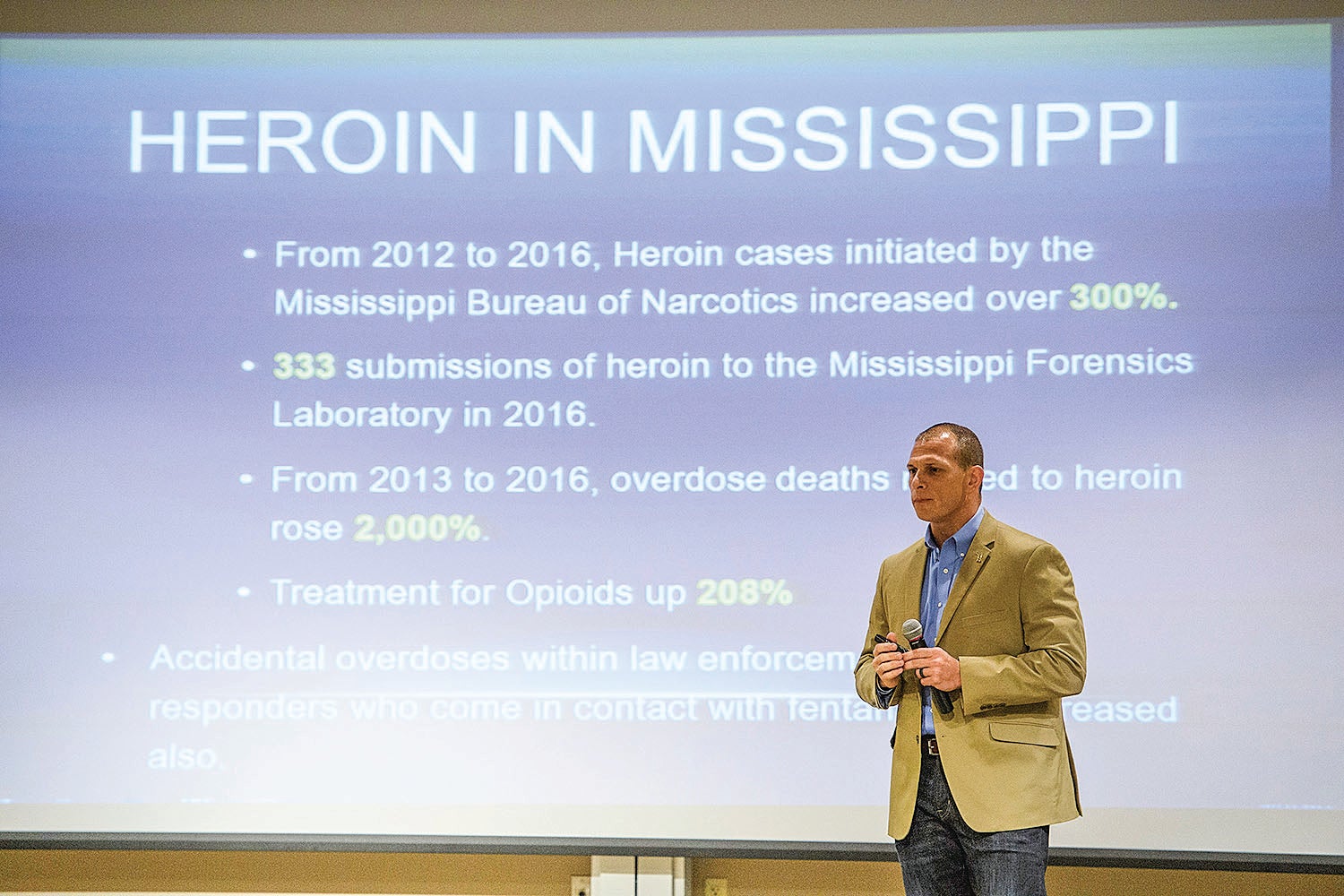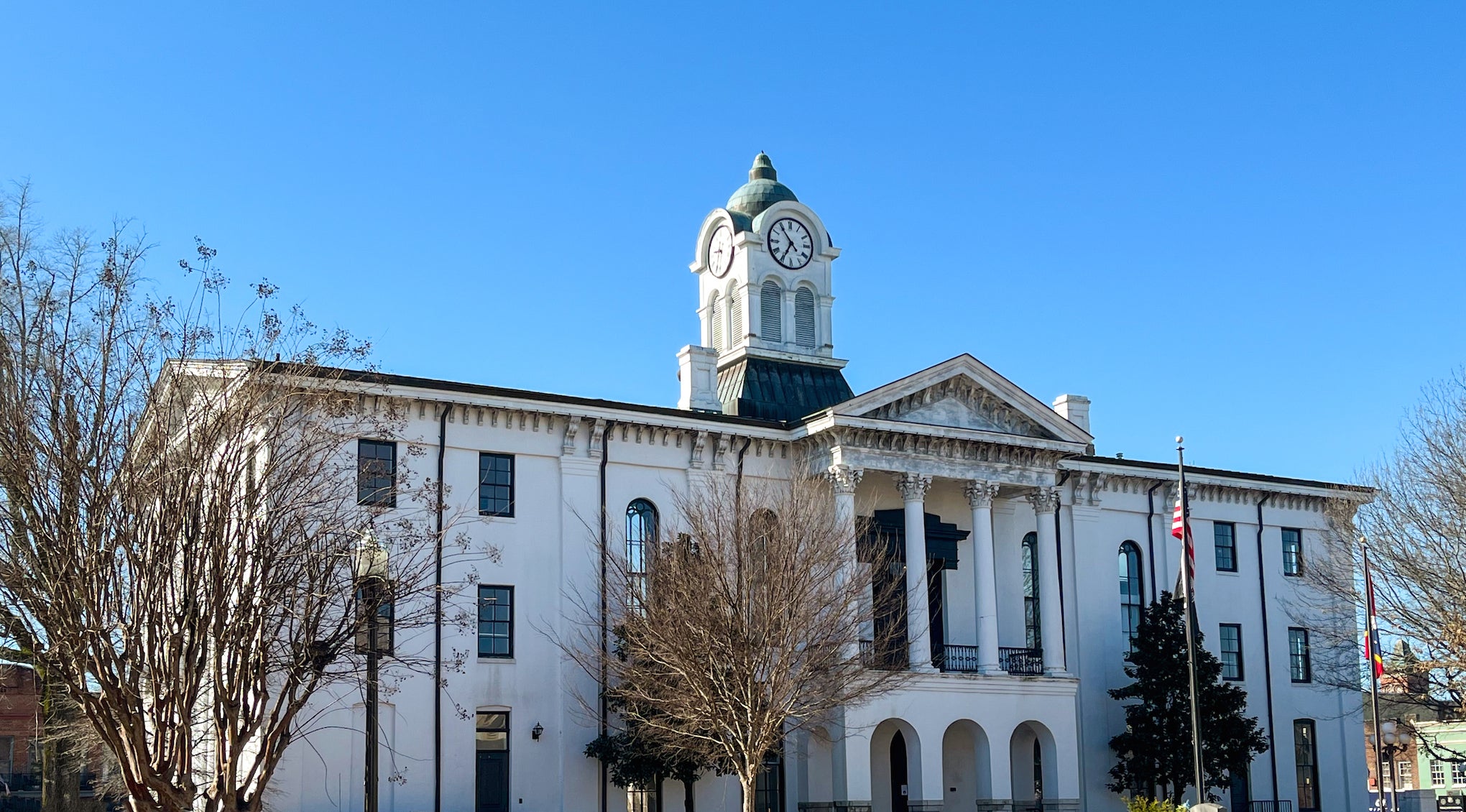LOU Community part of Mississippi’s opioid, heroin epidemic
Published 5:00 am Sunday, October 22, 2017

- Mississippi Bureau of Narcotics Lt. John Harless speaks during an Opioid Town Hall Meeting in Oxford, Miss., Tuesday, Oct. 3, 2017. (Photo/Thomas Graning)
The rise in opioid abuse and heroin around the nation is well documented. While some states have been battling it for quite some time, Mississippi law enforcement agencies are now finding themselves becoming buried under drug cases involving prescription pain medicine and heroin sales and, in many cases, deaths.
According to the Mississippi Bureau of Narcotics, in terms of abuse and deaths, opioids account for the greatest proportion of the prescription drug problem. The increasing use of prescription narcotics for pain has drastically attributed to America’s opioid epidemic.
However, with laws now coming into play that are limiting doctors from over-prescribing narcotic pain medications, those patients who become addicted are looking toward heroin to feed their addiction.
“This misuse by individuals has caused the medical community to look at the way it prescribes opioids for treatment and, in turn, has made it more difficult and expensive to illegitimately gain access to prescription opioids,” said Lafayette County Metro Narcotics Director Rod Waller. “With the cost higher and ease of obtaining prescription opioids more difficult, these individuals are turning to heroin as a cheaper and easier to gain alternative.”
In 2013, there was one reported heroin-related death investigated by the MBN. In 2014, there were seven and in 2015 there were 18 heroin-related deaths. By 2016, the number of fatal overdoses hit 20. Not all drug overdose deaths are reported to MBN.
With the increase in opioid abuse on the rise in Mississippi, the Oxford, Lafayette and University communities are not immune to the growing epidemic.
“Oxford and Lafayette County are no exception when it comes to abuse of prescription opioids and heroin,” Waller said recently. “Like all counties in Mississippi, we have individuals who are diverting prescription opioids for personal use and also for illegal distribution for monetary gain on their part.”
Metro Narcotics is jointly funded by the city of Oxford, Lafayette County and the University of Mississippi and also receives state grants. Since his arrival to Oxford two years ago, Waller said that illegitimate distribution of prescription narcotics has been consistent.
“We are making undercover purchases and seizures,” he said. “We have seen a small rise in the use of heroin during this time with most of the heroin being purchased in other locations and brought back here and consumed, but we have purchased heroin here (Lafayette County).”
According to figures released by the MBN earlier this month during a public town hall meeting on the abuse of opioids at the Oxford Conference Center, between 2013 and 2016, Lafayette County had 13 people die from drug overdoses. Of those, nine were from prescription opioids, and three were from heroin. One of those deaths was the result of someone overdosing on both heroin and a prescription pain medicine.
In 2016, the MBN investigated seven heroin cases in Lafayette County.
Waller said laws making it harder for people to get prescription opioids that are unregulated through pain management clinics have helped curb the misuse and abuse of prescription opioids; however, tougher laws aren’t the only answer to stop the rise of opioid addiction.
“The problem is as long as there is money to be made from the sale of drugs, people are going to sell them; and as long as there are people addicted to drugs, they are going to do what they can to get them,” Waller said. “I feel tougher laws are extremely important to this problem, but I also feel that treatment of addiction is important as well.”
Melody Madaris, director of substance abuse at Communicare in Oxford said the problem of prescription drug abuse doesn’t stop at opioids.
“When we discuss prescription drug addiction, we are not only speaking of opioids but also about benzodiazepines and stimulants,” Madaris said. “Prescriptions such as Xanax, Klonopin and Ativan, all three benzodiazepines, are common drugs of abuse and misuse, as well as prescriptions such as Adderall, Concerta, and Ritalin, all three which are stimulants, are also common drugs of abuse and misuse in this area. We often hear of students purchasing a stimulant before a big test or project believing that it is not harmful.”
Madaris said many of the patients treated by Communicare for addiction started out with a legitimate injury and were prescribed opioids by a doctor.
“By the time the addiction is fully in control, they can no longer afford to purchase pills off the street and they resort to heroin because of the cost,” Madaris said.
Communicare started collecting data in September on how many clients are coming to Communicare after being treated for an overdose.
“We have had almost 20 people participate in the data collection and they reported a combined 51 overdoses between them,” she said. “Most of them did report coming to treatment after an overdose. By working closely with hospitals and physicians, we are beginning to obtain immediate referrals from the hospital when an overdose takes place, which is our goal.”
The signs of opioid and/or heroin addiction are the same as for most drug addictions, according to Madaris. Those include behavioral changes, lies, financial problems, changing of friends, employment or school problems, overwhelming anxiety or sadness, increased anger, weight loss, pupil dilation or constriction and changes in eating and sleeping patterns.
When someone admits to their addiction, getting help as soon as possible is of the utmost importance, whether at Communicare or other local addiction treatment centers, Madaris said.
“I think it is very important to add that addiction is not a moral failure,” Madaris said. “Addiction is a disease and is recognized by the American Medical Association as such. I believe it is important for the community, as a whole, to become more informed about addiction and make a small effort to help change the stigma. Many people do not seek help for their addiction and/or their mental illness until it consumes them, because of the continued stigma surrounding these topics.
“I have been amazed at the outpouring of understanding and love the Oxford-Lafayette community has for all individuals and I know if we all help one another, we can help change the stigma, here in our own backyard.”





